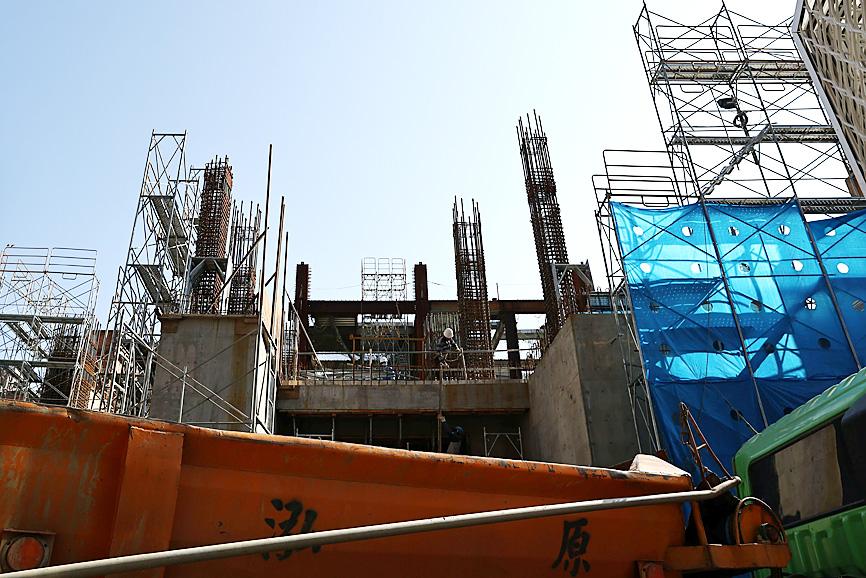China’s move to tighten control of crude steel production, coupled with continued strong demand from downstream industries, is expected to have a positive effect on major players in the local steel industry this year, Yuanta Securities Investment Consulting Co (元大投顧) said.
Steel prices are also expected to remain robust on tight supply, despite a likely decline in iron ore prices in the second half of this year after the easing of a shortage in key raw materials for making steel, Yuanta analysts led by Leo Lee (李侃奇) said in a report on Wednesday last week.
The improving supply-demand dynamics come at a time when China is attempting to reduce crude steel production so that it can meet a carbon neutrality target that it set as part of its 14th Five-Year Plan released in October last year.

Photo: Ann Wang, Reuters
For example, Tangshan, China’s top steelmaking city, plans to reduce capacity by 30 to 50 percent by the end of this year, Yuanta said.
Japan’s green energy development has prompted Nippon Steel & Sumitomo Metal Corp to shut down 20 percent of its blast furnace capacity by 2025, leading to a continuously tight supply, the report said.
“We expect supply-demand dynamics in the steel industry to be similar to those seen in the cement industry in the past two to three years — that is, tight supply, strong demand and low inventory levels. Thus, we expect a strong upside for steel mills’ earnings,” Yuanta analysts said.
The World Steel Association forecast that global steel demand this year would increase 4.1 percent to 1.79 billion tonnes year-on-year, following a 2.4 percent decline to 1.72 billion tonnes last year amid the COVID-19 pandemic.
The recovery in demand is supported by increased investment in infrastructure in China, the US’ eight-year US$2.3 trillion stimulus package, a global recovery in the auto market and a robust demand for machine tools, Yuanta said.
In Taiwan, the positive momentum is supported by a strong real-estate market, construction of infrastructure and manufacturers returning home, which especially support a demand for rebar and section steel, they said.
Given the market environment, China Steel (中鋼), Taiwan’s largest steelmaker, would benefit the most, while other downstream companies, such as hot-rolled coil maker Chung Hung Steel Corp (中鴻鋼鐵), re-rollers such as Yieh Phui Enterprise Co (燁輝企業) and Sheng Yu Steel Co (盛餘鋼鐵), and secondary processor Hsin Kuang Steel Co (新光鋼鐵), would also benefit from hikes in steel prices, the report said.
Electric furnace operators Tung Ho Steel Enterprise Corp (東和鋼鐵), Feng Hsin Steel Co (豐興鋼鐵), Wei Chih Steel Industrial Co (威致鋼鐵) and Hai Kwang Enterprise Co (海光企業) are likely to benefit from robust demand in domestic construction, with earnings to remain high as the price of rebar and section steel would reflect hikes in scrap steel prices, it said.
Hikes in scrap steel prices are driven by a rising demand for scrap steel amid China’s effort to increase production at electric furnaces, which emit less carbon dioxide and greenhouse gases during coking than blast furnaces, it added.

United Microelectronics Corp (UMC, 聯電) expects its addressable market to grow by a low single-digit percentage this year, lower than the overall foundry industry’s 15 percent expansion and the global semiconductor industry’s 10 percent growth, the contract chipmaker said yesterday after reporting the worst profit in four-and-a-half years in the fourth quarter of last year. Growth would be fueled by demand for artificial intelligence (AI) servers, a moderate recovery in consumer electronics and an increase in semiconductor content, UMC said. “UMC’s goal is to outgrow our addressable market while maintaining our structural profitability,” UMC copresident Jason Wang (王石) told an online earnings

Gudeng Precision Industrial Co (家登精密), the sole extreme ultraviolet (EUV) pod supplier to Taiwan Semiconductor Manufacturing Co (TSMC, 台積電), is aiming to expand revenue to NT$10 billion (US$304.8 million) this year, as it expects the artificial intelligence (AI) boom to drive demand for wafer delivery pods and pods used in advanced packaging technology. That suggests the firm’s revenue could grow as much as 53 percent this year, after it posted a 28.91 percent increase to NT$6.55 billion last year, exceeding its 20 percent growth target. “We usually set an aggressive target internally to drive further growth. This year, our target is to

The TAIEX ended the Year of the Dragon yesterday up about 30 percent, led by contract chipmaker Taiwan Semiconductor Manufacturing Co (TSMC, 台積電). The benchmark index closed up 225.40 points, or 0.97 percent, at 23,525.41 on the last trading session of the Year of the Dragon before the Lunar New Year holiday ushers in the Year of the Snake. During the Year of the Dragon, the TAIEX rose 5,429.34 points, the highest ever, while the 30 percent increase in the year was the second-highest behind only a 30.84 percent gain in the Year of the Rat from Jan. 25, 2020, to Feb.

Cryptocurrencies gave a lukewarm reception to US President Donald Trump’s first policy moves on digital assets, notching small gains after he commissioned a report on regulation and a crypto reserve. Bitcoin has been broadly steady since Trump took office on Monday and was trading at about US$105,000 yesterday as some of the euphoria around a hoped-for revolution in cryptocurrency regulation ebbed. Smaller cryptocurrency ether has likewise had a fairly steady week, although was up 5 percent in the Asia day to US$3,420. Bitcoin had been one of the most spectacular “Trump trades” in financial markets, gaining 50 percent to break above US$100,000 and